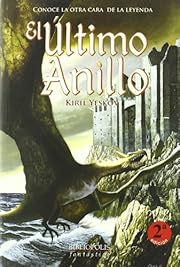

Click on a thumbnail to go to Google Books.
|
Loading... The Last Ringbearer (1999)by Kirill Yeskov

Parallel Novels (32) Russian Literature (181) No current Talk conversations about this book.   ) )"The Last Ringbearer" is not an attempt at a piece of typical fan-fiction or a sequel to Tolkien's opus. Rather, it aims to be an "apochryphal" work along the lines of "Rozenkrantz and Gildenstern Are Dead"; less accessible than the original and deliberately weird. This story recasts the Lord of the Rings as a mythologized history of that story's victors, leaving out a great deal and emphasizing minor points to the benefit of the storytellers. "The Last Ringbearer"'s version of the War of the Ring involves a great deal of Cold War spycraft and Soviet-inspired politicking. While the writing is a little awkward, especially the pacing and any extended narrative sections, the overall story holds together and there are a handful of well-developed characters. Unfamiliar words in this book: Bactrian - a word referring to a specific desert, used to mean a desert thing generally or the type of camel native to that specific desert. Basturma - Armenian raw-smoked meat. Caravanserais - A small outpost town meant as a caravan stop. Firn - Grainy snow that has been partially melted and refrozen. Garden of Thirteen Stones – A type of Japanese garden containing thirteen stones, placed so that only twelve are visible from any vantage point. Graphomaniac - A compulsive writer. Hachapuri - Georgian cheese-filled bread pockets. Hamada – A type of desert landscape: barren, hard, rocky plateaus with very little sand. Hamadas exist in contrast to ergs, which are large areas of shifting sand dunes. Ichiga – a Siberian soft-soled tall boot for swampy forests. Mangal - a Turkish outdoor wood-fired grill or a barbecue prepared on one. Pifos - Greek a large ceramic jug. Planimetric - The study of plane measurements, including angles, distances, and areas. Plenipotentiary - representative Ponyaga - a Siberian load-carrying device that looks like a cross between a backpack and a hand cart. Rostrum – the ram bow of a naval ship. Salsola - A salt water tolerant shrub. Scree - A mass of small loose stones that form or cover a slope on a mountain. Serge - A strong woolen cloth. Skua - A kleptoparasitic species of seabird. Even if your familiarity with Tolkein's Middle Earth is restricted to watching Peter Jackson's films (which I regard as more worthwhile than the books, at any rate) you will definitely get something from this. Finally, something to do with the Lord of the Rings universe with which I can engage. Before I was resigned to opining, in a manner which was unwittingly hipster and irritating, "I actually prefer The Silmarillion". It's a re-imagining of the LOTR universe from a stance of rigour which extends beyond the common-room parlour-games of Tolkein's invented languages. Yeskov himself has written an essay explaining why he found it necessary to create this tale which tells of the events in and around the LOTR from the perspective of Mordor. It is no mistake that this work of revisionary fantasy comes from Russia, and parallels with Soviet propaganda, espionage, and the brutality of warfare elevate this far above fan fiction. It is a work of literature in its own right, not quite the Aeneid to Tolkein's Iliad and Odyssey, but not bloody far off it. Excellent. This is an unauthorised sequel to / alternate history of The Lord Of The Rings, in which Orcs and Trolls are just other races of humans, dehumanised by the other side's propaganda. It has a lot of really interesting ideas in it, and does a wonderful job of fleshing out some parts of Middle-Earth that Tolkien didn't, and tying a radically different reading of the events of LoTR together coherently. The writing is patchy, with some wonderful passages (especially the desert scenes) and some rather clunky parts. Similarly some parts of Yeskov's additions to Middle-Earth feel deliciously alive and fitting, while others are either too blatantly a specific place on our Earth or a set of stereotypes about particular regions and their peoples. At times I got tired of following the multiple levels of spy-versus-spy or court intrigue, but on the whole this was a lot of fun to read.
Well, there's two sides to every story, or to quote a less banal maxim, history is written by the winners. That's the philosophy behind "The Last Ringbearer," a novel set during and after the end of the War of the Ring (the climactic battle at the end of "The Lord of the Rings") and told from the point of view of the losers. The novel was written by Kirill Yeskov, a Russian paleontologist, and published to acclaim in his homeland in 1999. Translations of the book have also appeared in other European nations, but fear of the vigilant and litigious Tolkien estate has heretofore prevented its publication in English. Is a retelling ofWas inspired byAwards
A retelling of the Lord of the Rings from the POV of Sauron. *I do not own this book, this is simply a way of having the English translation in a book format as opposed to a .pdf on a screen. I own none of the characters, content or covers attached to this book. If you wish to have a copy, please contact me and I will send you the .pdf as it is not fair for me to make any profit from someone else's work. No library descriptions found.
|
Current DiscussionsNonePopular covers
 Google Books — Loading... Google Books — Loading...GenresMelvil Decimal System (DDC)891.7342Literature Other literatures East Indo-European and Celtic literatures Russian and East Slavic languages Russian fiction USSR 1917–1991 Early 20th century 1917–1945LC ClassificationRatingAverage: (3.53) (3.53)
Is this you?Become a LibraryThing Author. |
|||||||||||||||||||||||||||||||||||||||||||||||||||||||||||||||||||||||||||||||||||||||||||||||||||||||||||||||||||||||||||||||||||